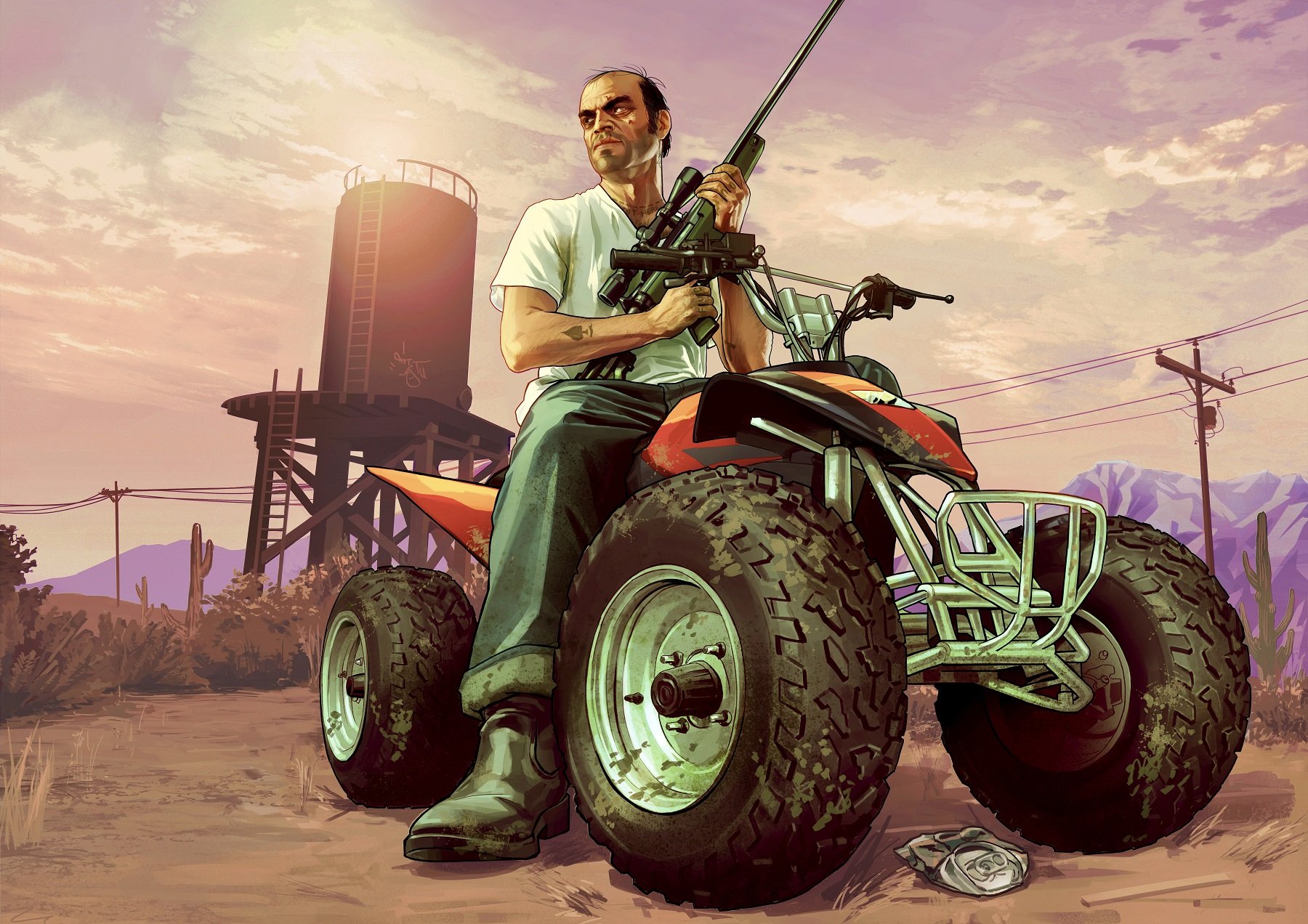To commemorate its upcoming re-release on the PS5, revisiting Grand Theft Auto V for the first time in several years and with a much older perspective has been an interesting experience to say the least.
Ranked as one of the most successful video games of all time, Grand Theft Auto V seems almost impervious to criticism. However, while it is still certainly deserving of its praise in some areas, in particular the impressive scope of its world, the game nevertheless stands out as somewhat of a disappointment, especially compared to previous entries in the GTA series. In some ways, Grand Theft Auto V is a microcosm of the franchise’s gradual shift towards realism and, consequently, less dynamic and more confined gameplay. In addition, and arguably its biggest failings, is within the game’s shoddy narrative and satire, which often lacks effectiveness and depth.
The most stand-out element is in the construction of its world-building. Grand Theft Auto V is set in the Southern California-inspired state of San Andreas. It lovingly borrows numerous real-life iconography to capture a sense of realism and set forth the themes it later hints at during missions; providing players an immense, beautiful game world that is meticulous, rich and vibrant in every detail. On the surface, this seems without issue. However, as soon as the world is interacted with in even the slightest of ways, it erodes away almost immediately, revealing the underlying limitations to this ‘open-world’ space. For example, NPCs will irrationally begin fights as you walk by, doing nothing but observing. In essence, San Andreas turns out as a fragile illusion in almost every area. You can admire its incredible world, but only at a removed position, so as not to threaten Rockstar’s careful design and set-up. The dissonance here is something that affects almost every other area of Grand Theft Auto V, from the recurrence of ludonarrative issues from previous entries in the franchise such as GTA IV, to the conflicted failings of its explicit commentary.

Rockstar
These limitations are most clear in its gameplay. This is imposed in how missions and the game world’s many various mechanics are scripted. In the process, player independence and creativity that truly live up to the concept of an ‘open-world sandbox’ has been largely restricted. Instead it forces the player to follow linear instructions and events in order to proceed, dragging them through missions burdened with little variance. Besides Rockstar’s recent Red Dead Redemption 2, Grand Theft Auto V is perhaps most guilty of this accidental restraint. It persistently fails the player for attempting to break away from script demands in even the least important of missions and areas, such as attempting to take a different approach or in how you fight with enemies. This tedious and tired gameplay structure has become increasingly problematic over the course of the Grand Theft Auto series, diminishing the fullest potential of the physics engine and game mechanics.
As a consequence of this distancing between the player and the game, its narrative suffers. Though GTA’s story has never always been the primary thing on players’ minds, there has always been a clear interest in crafting something engrossing both in its plot and character developments, particularly with its protagonists. In opting for a triptych of central characters, there is a distinct lack of narrative focus throughout the game, devaluing the weight of their interpersonal drama. Plot threads begin and are dropped, with none given any real precedence. One minute, we are dealing with Trevor’s comedy-oriented business dealings, and the next we are expected to seriously care about Michael’s issues. There exists an occasional struck balance between the two tones, and the writing, at points, showcases some level of effort in getting you to empathise with the three characters. Nevertheless, it’s never as consistent enough to keep the player as engaged as they should be.
In the process of forgoing any real structure or pacing, there becomes no real personal incentive to care for these characters or the situations they get themselves embroiled in. Each definitely have interesting qualities, mostly off the backbone of the excellent voice work throughout, and there is a lot of potential to be just as fleshed out as previous GTA protagonists. It simply refuses to show real interest in going beyond the superficial. The game does offer the ability to learn more about the three protagonists, their relationships with each other and others through meet-ups outside of main missions, but these are, at best, bite-sized and don’t wholly make up for the lacking narrative. By missing out on these crucial elements, any engagement in the game’s lofty ideas surrounding familial dysfunction and the American dream (to name a few) falls somewhat short.

Rockstar
Perhaps the biggest failing of Grand Theft Auto V is the incomprehensibility of its commentary. Further chipping away at the illusion of San Andreas is the cheap use of vulgar jokes within its satire, visible in nearly every inch of the game world such as on numerous billboards and websites. The tongue-in-cheek satire the franchise has always employed suddenly comes into clash with its now much greater emphasis on realism. There is nothing inherently wrong with this approach, and on one hand it could be argued that this seemingly intentional aesthetic dichotomy between the beauty and the ugliness of the world gives an added sense of realistic depth, allowing the game to make its commentary. Even so, it’s in the execution which raises the game’s struggle between sincerity and cynicism, with its inability to compromise between the two forms that, altogether, would bolster its commentary.
Grand Theft Auto V likes to pretend it has something to say about modern day America, and it displays the ability to present these themes startlingly well, as in the controversial mission ‘By the Book’. Nevertheless, this is wrapped up in a thin layer of overwhelming negativity and irony. Like the narrative, the game is stuck oscillating between disparate ideas. Grand Theft Auto V is not allowed to let itself show any honest emotion or allow players to think for themselves of the weight behind these themes, deciding to disguise it with snark, as though it were afraid of having meaning. As a result, it feels relentlessly pessimistic with little rhyme or reason. If the goal of the game is to present this obvious reflection of our own reality and exaggerate its worst aspects in order to just simply accept it exists with no elaboration beyond that, it actively undermines any sort of gravitas it might have had. This is especially confusing considering the unquestionable technical care and craft behind it all. It is at once bewildering and callous, its ideas bordering on pure nihilism, though even then never fully committing either way. There are moments, too, where the satire does manage to work. For example, the ‘Strangers and Freaks’ mission with the Epsilon Program stands out as a particularly memorable parody of cults like Scientology. Even these by default, however, feel strangely empty.
Therein lies the disappointment of Grand Theft Auto V. In its over-reliance on cynicism, it overlooks how to move past what appears on the surface of its ideas. Moreover, with the extreme lengths to which the game is reluctant to express itself beyond prepubescent satire, it foregoes nuance and potency. It feels like a massive step-back considering the success of previous entries in towing the line and generating impact effortlessly, leaving a lingering sense of melancholy and sadness at this lost potential. Grand Theft Auto V is fully aware of the power of its subtext. It’s simply unsure of what more it could say. More than that, however, Grand Theft Auto has not just lost its way. It has lost its edge.
As recently announced, Grand Theft Auto V will be coming to PS5 and Xbox Series X in “the second half of 2021”. You can see this in a new trailer below.



